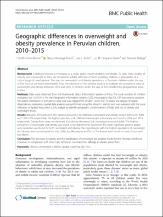Geographic differences in overweight and obesity prevalence in Peruvian children, 2010–2015

View/
Download
(application/pdf: 2.984Mb)
(application/pdf: 2.984Mb)
Date
2018Author(s)
Torres-Roman, J. Smith
Urrunaga-Pastor, Diego
Avilez, Jose L.
Helguero-Santin, Luis M.
Malaga, German
Metadata
Show full item recordAbstract
Background
Childhood obesity is emerging as a major public health problem worldwide. To date, most studies of obesity and overweight in Peru are focused on adults, with few of them involving children, a population at a critical stage of development. The trend in overweight and obesity prevalence in Peruvian children under the age of five has not yet been determined. Thus, the objective of the present study is to evaluate the prevalence rates of overweight and obesity between 2010 and 2015 in children under the age of five, stratified by geographical areas in Peru.
Methods
Data were obtained from the Nutritional Status Information System of Peru. The total number of children evaluated was 14,155,914. For the Geographic Information Systems (GIS), the program Geo Da 1.8® was used to ascertain the spatial distribution of prevalence rates and was mapped for children under five. To assess the degree of spatial dependence, exploratory spatial data analysis was performed using the Moran’s I statistic and was assessed with the Local Indicators of Spatial Association (LISA) analysis to identify geographic concentrations of high and low of obesity and overweight levels.
Results
Between 2010 and 2015, the national prevalence of childhood overweight and obesity ranged from 6.2%- 6.8% and 1.5%–2.7%, respectively. The highest prevalence of childhood overweight and obesity was found in 2014 and 2013, respectively. During these years, we observed that obesity decreased, but overweight remained stable. The highest prevalence of overweight and obesity was found in the departments located on the coast. Significant positive spatial autocorrelation was found for both overweight and obesity. The departments with the highest prevalence of overweight and obesity were concentrated in Lima, Callao, Ica, Moquegua and Tacna. The lowest were found in Loreto, Cusco and San Martin.
Conclusion
The decrease in obesity and the stabilisation of overweight are positive results for the Peruvian childhood. However, in comparison with other Latin American countries, Peru still lags in obesity prevention.
Collections
- Artículos [274]







